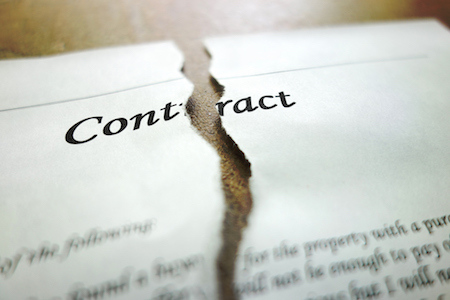Originally Published: September 2017
Updated: May, 2023
The purchase or sale of a piece of real estate can often be a long and complicated process. With proper due diligence, communication and adherence to the process, most real estate deals will go off without a hitch – but sometimes a deal can fall through, leaving both buyer and seller in some uncertainty.
What happens when a real estate deal falls through?Read on to get an idea of what to expect when a real estate deal falls apart:
What to Expect as the Buyer
Protecting your assets and taking the appropriate legal action are your main priorities as a buyer when a real estate deal falls through. The more information you have, the more prepared and easeful the process can feel. If a real estate deal falls through, it may be beneficial to consult with an expert in real estate law to explore your options.
Return Your Deposit
There’s a few considerations regarding the return of your deposit: the terms should be outlined in the purchase agreement. If the deal falls through due to reasons stipulated in the contract, you may be entitled to a full or partial refund of the deposit money. If you backed out of the deal without a valid reason, the seller may be entitled to keep the deposit and charge for storage fees, ongoing property taxes, or mortgage interest until they can sell the property.
Financial Implications
If you were securing a mortgage for the property and the deal falls through, you will need to inform your lender of this change. Depending on the stage of the process, you may be able to cancel or modify your loan application. However, if the financing contingency has expired or you were unable to secure the necessary financing, you may face financial consequences such as losing any fees paid for the loan application or appraisal.
Legal Considerations
If you believe that the seller breached the contract or acted in bad faith, you should consult an experienced real estate lawyer to understand your legal rights and explore your options. Epstein and Associates can guide you through the process and advise on the best course of action.
What to Expect as the Seller
Financial Implications
If the buyer then finds similar property they may have a claim against you if they had to pay more for the second property.
As the seller, you may also be responsible for damages for alternative accommodations, storage fees, and additional moving expenses incurred by the purchaser as a result of their failure to close.
If the buyer decides to back out of the deal, as the seller you are entitled to hold on to the buyer’s deposit (through your real estate agent) and relist the property for sale. You may take the buyer to court for any damages you sustain and may pursue the buyer for any shortfall over and above the deposit.
To protect yourself as a seller, it is important to ensure there is a sufficient deposit on a real estate transaction. We typically suggest no less than 10% of the purchase price. However, it is always best to consult with a lawyer who can guide you through this process.
Consider Re-Negotiations
Depending on the reasons for the deal falling through, you may choose to re-engage with the buyer to explore the possibility of re-negotiating the terms. This could involve addressing any concerns raised during the failed transaction or adjusting the price or terms to facilitate a new agreement.
Before re-negotiating with a buyer it’s important to consult an expert in real estate law to protect yourself from any further complications.
Legal Considerations
If you believe that the buyer breached the contract or acted in bad faith, you may want to consult with a real estate attorney to understand your legal rights and explore your options.
If you are experiencing a real estate deal that’s fallen through, or if you want to protect yourself, contact the experienced real estate lawyers at Epstein and Associates for a free consultation.
This blog is made available by the law firm publisher, Epstein & Associates, for educational purposes. It provides general information and a general understanding of the law but does not provide specific legal advice. Any specific questions about your legal concerns please contact us now and speak to an expert today.
